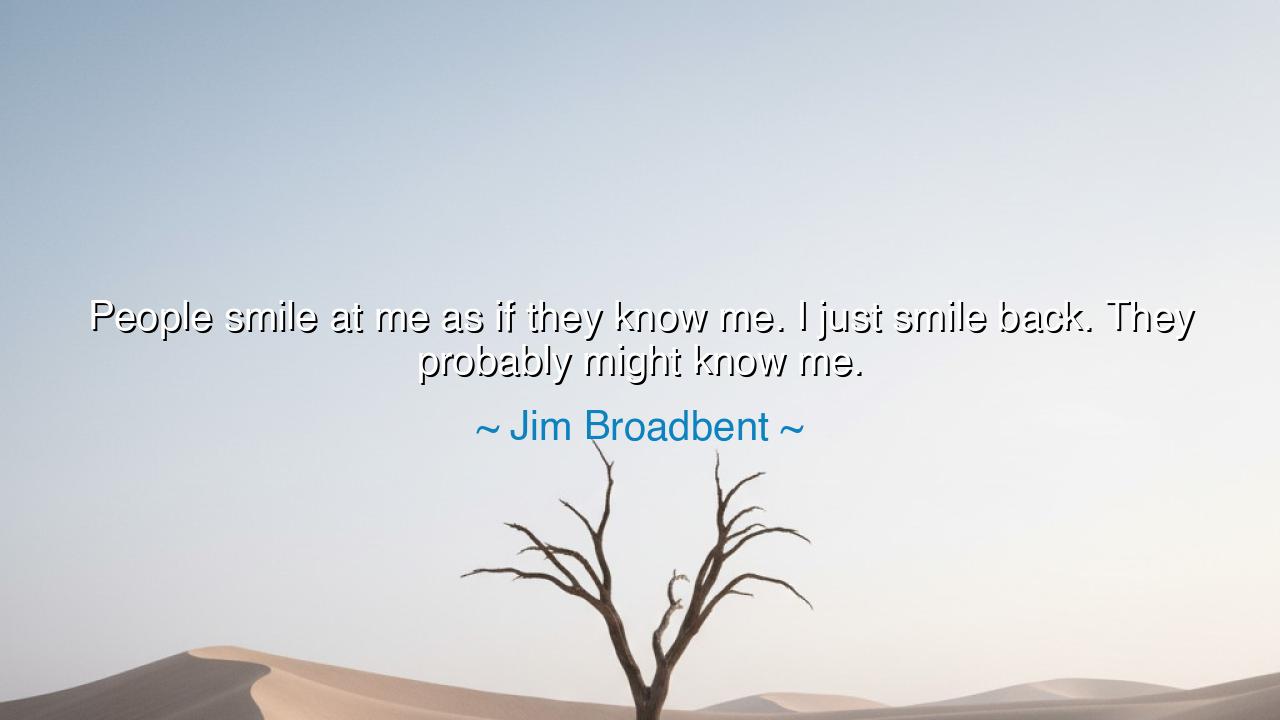
People smile at me as if they know me. I just smile back. They






Jim Broadbent, a man of gentle presence and quiet greatness, once mused: “People smile at me as if they know me. I just smile back. They probably might know me.” In these words, wrapped in humility, lies a truth about recognition, fame, and the simple bonds of humanity. For though he has walked upon great stages and lit the silver screen, he meets the world not with vanity, but with kindness, returning the smile of strangers as though they were old friends.
The ancients too understood this mystery—that the face of the artist, the leader, or the sage becomes familiar to the multitude, though the multitude remains unknown to him. It was said that Socrates, walking the streets of Athens, was greeted by all as though they had sat at his table. In truth, only a few had conversed with him deeply, yet his presence in the city made him feel like kin to all. Broadbent’s words are an echo of this truth: that through one’s works, one enters into the lives of countless others, and thus one is known, even by those one has never seen.
But mark the humility of his response. Where another might walk in pride, reveling in recognition, Broadbent chooses to simply smile back. This is wisdom: for the smile bridges the distance between stranger and friend, between the known and the unknown. It is a universal language that requires no introduction, no title, no explanation. His words remind us that the truest response to the gaze of others is not suspicion nor arrogance, but kindness.
History offers us examples of this sacred exchange. Consider Abraham Lincoln, who, though burdened with the weight of a nation in war, was remembered by many for his willingness to greet even strangers with a nod, a word, or a smile. The people felt they knew him, though few ever spoke to him. It was not the office alone, but the warmth of his presence, that made him beloved. Broadbent’s reflection captures this same quality: that the greatness of a life is found not in keeping oneself apart, but in being approachable, familiar, and human.
There is also in these words the acknowledgment of the strange gift of recognition—that art makes us known to others in ways we do not fully see. The actor or artist may forget the roles, but those roles live forever in the hearts of those touched by them. Thus, when the passerby smiles, it is not only at the man, but at the memories, the laughter, or the tears he once gave them through his work. By smiling back, Broadbent honors those unseen connections, acknowledging that every glance carries a story.
Practical wisdom flows from this: when others greet you with warmth, even if you do not recognize them, return the warmth. A smile is a small gesture, but it may carry immense meaning. It may confirm to the other that they are seen, valued, or remembered, even if only in spirit. Live so that strangers can approach you without fear, and let your demeanor be that of one who is always ready to know and to be known.
Therefore, O seeker, take Jim Broadbent’s teaching to heart: do not measure recognition by pride, nor dismiss the smiles of others as trivial. For in each one lies a bridge, a reminder that we are bound together in ways unseen. Return the smile; walk humbly in the knowledge that your presence may already dwell in the lives of others; and strive always to be the kind of person whose name, when remembered, brings warmth to the face and light to the heart.






AAdministratorAdministrator
Welcome, honored guests. Please leave a comment, we will respond soon